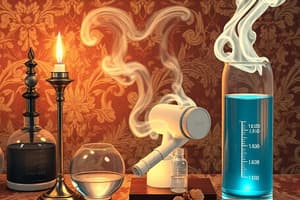Podcast
Questions and Answers
Which property describes the ability of gases to fill all available space in a container?
Which property describes the ability of gases to fill all available space in a container?
- Compressibility
- Expansion (correct)
- Indefinite shape
- Low density
What does Boyle's law state about the relationship between volume and pressure for a given amount of gas at constant temperature?
What does Boyle's law state about the relationship between volume and pressure for a given amount of gas at constant temperature?
- Volume always increases with increased pressure.
- Volume is inversely proportional to pressure. (correct)
- Volume is directly proportional to pressure.
- Volume is equal to pressure times a constant.
Which gas law relates the volume of a gas to its absolute temperature at constant pressure?
Which gas law relates the volume of a gas to its absolute temperature at constant pressure?
- Ideal gas law
- Avogadro's law
- Charles's law (correct)
- Boyle's law
What does Avogadro's law state about equal volumes of gases under the same conditions?
What does Avogadro's law state about equal volumes of gases under the same conditions?
What is the approximate molar volume of an ideal gas at standard temperature and pressure (STP)?
What is the approximate molar volume of an ideal gas at standard temperature and pressure (STP)?
What does the ideal gas law state about the relationship between pressure, volume, and temperature?
What does the ideal gas law state about the relationship between pressure, volume, and temperature?
How does the density of a gas change with increasing temperature, assuming pressure and molar mass remain constant?
How does the density of a gas change with increasing temperature, assuming pressure and molar mass remain constant?
According to Dalton's Law of Partial Pressures, how is the total pressure of a gas mixture determined?
According to Dalton's Law of Partial Pressures, how is the total pressure of a gas mixture determined?
What formula can be used to calculate the density of a gas that follows the ideal gas law?
What formula can be used to calculate the density of a gas that follows the ideal gas law?
What happens to the density of a gas if its molar mass increases, assuming pressure and temperature stay constant?
What happens to the density of a gas if its molar mass increases, assuming pressure and temperature stay constant?
Flashcards are hidden until you start studying
Study Notes
Properties of Gases
- Gases expand indefinitely to fill their container.
- Gases have no definite shape, taking the shape of their container.
- Gases are highly compressible due to the large spaces between gas molecules.
- Gases mix evenly and completely when combined in the same container.
- Gases have much lower densities than liquids and solids.
The Gas Laws
- Ideal Gas Law: PV = nRT, where P = pressure, V = volume, n = moles, R = ideal gas constant (0.0821 L atm K-1 mol-1), and T = absolute temperature.
- Boyle's Law: At constant temperature, the volume of a gas is inversely proportional to its pressure. (P1V1 = P2V2)
- Charles's Law: At constant pressure, the volume of a gas is directly proportional to its absolute temperature. (V1/T1 = V2/T2)
- Avogadro's Law: Equal volumes of different gases at the same temperature and pressure contain the same number of molecules (or moles). (V = nk3)
- The molar volume of an ideal gas at STP (Standard Temperature and Pressure: 0°C and 1 atm) is 22.4 L.
- Combined Gas Law: P1V1/T1 = P2V2/T2, relates changes in pressure, volume, and temperature for a fixed amount of gas.
Gas Density
- Gas density (d) is calculated as d = m/V, where m is the mass and V is the volume.
- The density of a gas is directly proportional to its molar mass.
- Gas density increases with increasing pressure and decreases with increasing temperature.
Dalton's Law of Partial Pressures
- The total pressure of a gas mixture is the sum of the partial pressures of each component gas. (Pt = PA + PB + PC + ...)
- The partial pressure of a gas is proportional to its mole fraction in the mixture. (PA = XAPt)
- When gases are collected over water, the total pressure is the sum of the partial pressure of the collected gas and the partial pressure of water vapor. (Pt = Pgas + PH2O)
Studying That Suits You
Use AI to generate personalized quizzes and flashcards to suit your learning preferences.




